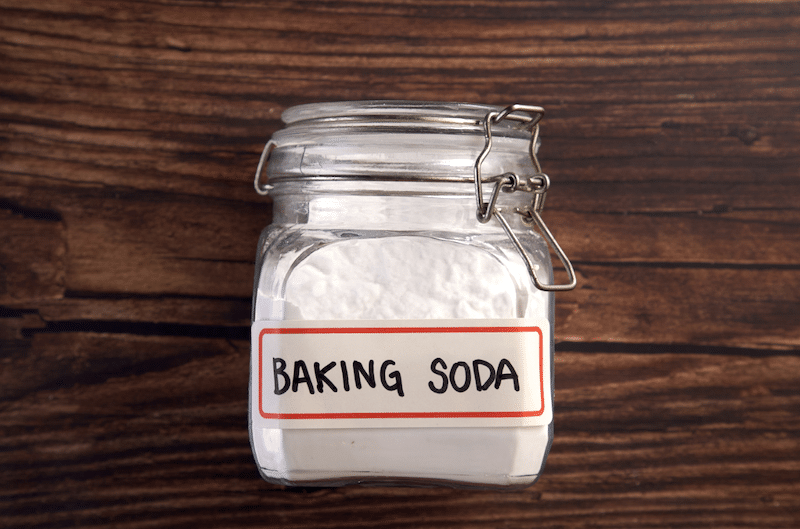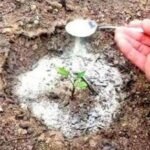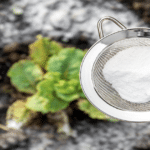Understanding the Science: What is Baking Soda?
Firstly, to appreciate the impact of baking soda on plants, we must delve into its basic chemistry. Known scientifically as sodium bicarbonate, baking soda is a white crystalline powder revered for its neutralizing capabilities. The power it holds to balance pH levels is exactly what makes it a worthy ally in the garden.
The Benefits of Baking Soda for Plants
Baking soda’s benefits for plants are manifold, serving various functions from boosting plant health to providing natural pest control.
1. Enhancing Plant Health
Applying baking soda on plants can lead to enhanced plant health, especially in the case of certain fungi-prone species. Baking soda helps create an unfavorable environment for fungi, giving your plants the upper hand in staying disease-free.
2. Natural Pest Control
Another noteworthy advantage of using baking soda is its role as a natural pesticide. By creating a hostile environment for pests, baking soda helps protect your plants without the need for harsh, potentially harmful chemicals.
3. Soil pH Modulator
Baking soda can also be used to modify the soil pH, particularly in alkaline soils, aiding in the optimal growth of plants. However, due care should be taken while using it for this purpose, as excessive use can lead to soil imbalance.
Implementing Baking Soda in Your Garden: Practical Tips
While the benefits of baking soda for plants are clear, its effectiveness lies in its proper application. Here are some tips on how to use baking soda in your garden:
1. Creating a Baking Soda Spray
A baking soda spray is a versatile tool for any gardener. Simply mix one teaspoon of baking soda with a quart of water, and you have a solution ready to tackle fungal diseases and pests.
2. Using Baking Soda as a Soil pH Modulator
Remember to apply baking soda sparingly when used as a soil pH modulator. It’s recommended to test your soil’s pH before and after application to ensure optimal conditions for your plants.
Conclusion: Baking Soda – A Gardener’s Best Friend
In conclusion, baking soda for plants emerges as a compelling, multi-faceted solution for various gardening hurdles. Its unique chemical properties, along with its environmental friendliness, make it a tool that every gardener should consider. However, like with any gardening aid, it should be used responsibly and in moderation to prevent potential harm to your plants.
Experience the Power of Baking Soda Today
Gardeners everywhere are harnessing the potential of baking soda to transform their green spaces. Don’t miss out on this garden game-changer; give baking soda a try today and witness the difference it can make for your plants!
Frequently Asked Questions about Baking Soda for Plants
In our quest to help you understand the impact of baking soda on plants better, we’ve compiled some of the most frequently asked questions on the topic.
1. Can Baking Soda Harm My Plants?
While baking soda is beneficial to plants when used correctly, improper usage can lead to potential harm. Excessive baking soda can lead to sodium build-up in the soil, disrupting nutrient absorption and potentially damaging your plants.
2. How Often Should I Use Baking Soda on My Plants?
The frequency of baking soda application depends on the specific issue you’re tackling. For example, for fungal diseases, a bi-weekly spray is usually sufficient. However, always observe your plants for any signs of stress or damage, and adjust your usage accordingly.
3. Can I Use Baking Soda on All Plants?
Baking soda is generally safe for most plants. However, some plants may be more sensitive than others. It’s always a good idea to test a small area first before applying it to the entire plant.
The Environmental Friendliness of Baking Soda for Plants
One of the remarkable aspects of using baking soda for plants is its environmental friendliness. Unlike many chemical pesticides and fertilizers, baking soda is non-toxic and biodegradable, posing minimal risk to the environment. By choosing baking soda, you’re making a choice that supports healthier plants and a healthier planet.
A Case Study: Baking Soda in Action
To demonstrate the practicality of using baking soda for plants, let’s explore a case study. Gardeners dealing with black spot fungus on roses found that a regular application of a baking soda solution significantly reduced the occurrence of the fungus, leading to healthier, more vibrant roses. This practical example underpins the potential of baking soda as a cost-effective and eco-friendly solution in gardening.
Conclusion: Embrace the Power of Baking Soda for Your Plants
The utilization of baking soda for plants presents an exciting, efficient, and environmentally friendly strategy for garden care. From enhancing plant health to providing natural pest control and modulating soil pH, baking soda proves its mettle as an indispensable tool for gardeners. So, next time you come across that box of baking soda in your pantry, remember – it’s not just for baking!
Start Your Green Revolution with Baking Soda
Are you ready to experience the gardening revolution that baking soda promises? Get started today and join a community of gardeners worldwide who are transforming their green spaces with the power of baking soda for plants.







